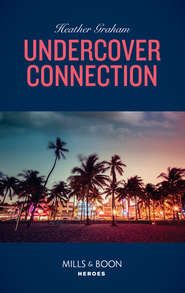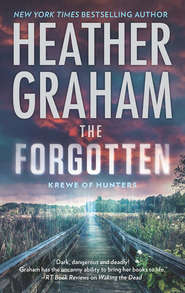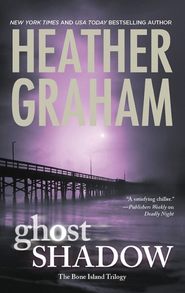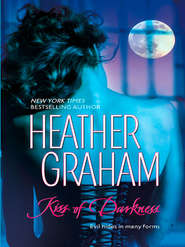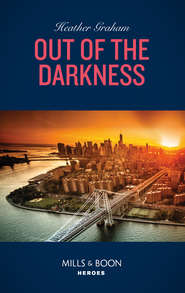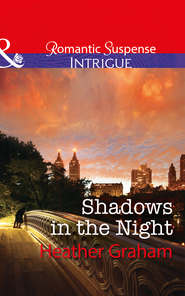По всем вопросам обращайтесь на: info@litportal.ru
(©) 2003-2024.
✖
Ghost Night
Автор
Год написания книги
2019
Настройки чтения
Размер шрифта
Высота строк
Поля
Somehow, Sean refrained from replying. He even kept smiling and staring straight at his uncle.
“Are you going to stare at the shadows? Or are you at least going to let the girl have her say?” Jamie demanded. “I’ll bring coffee,” he added.
“I know where the coffee is, thanks, Uncle,” Sean said. He came behind the bar to pour himself a cup, trying to get a better look at the woman at the booth.
She was waiting for him. There was no looking at her surreptitiously—she was staring back at him. She was still in the shadows, but his uncle seemed to be right about one thing—she was stunning. She had the kind of cheekbones that were pure, classic beauty—at eighty, she’d still be attractive with that bone structure. Her hair was golden and pale and simply long, with slightly rakish and overgrown bangs. He didn’t think she spent a lot of money in a boutique salon; the shades of color had come from the sun and the overgrown, rakish look was probably because she didn’t spend much time getting it cut.
She was dressed more like a native than a tourist—light cotton dress with a little sweater over her shoulders. Down here, the days were often hot, tempered only by the ocean and gulf breezes that were usually present. But inside, it could be like the new ice age had come—because of the heat, businesses were often freezing. Jamie kept his swinging doors to the outside open sometimes—it was a Key thing. Trying to be somewhat conservative in the waste of energy, the air blasted in the back, not near the front.
Coffee in hand, he walked back to the booth at last. “Hi. I’m Sean O’Hara. We’re doing interviews tomorrow and the next day at the old Beckett house, because, I’m assuming you know, it’s a joint project between David Beckett and myself.” He offered her his hand.
She accepted it. Her grip was firm. Her palms were slightly callused, but they were nice, tanned. Her fingers were long and she had neat nails, clipped at a reasonable length rather than grown out long.
Her eyes were steady on his.
“I’m Vanessa Loren,” she said. “I have real experience and sound credentials, but that’s not exactly why I’m here, or why I wanted to meet with you here.”
He shrugged, taking a seat opposite her in the booth.
“All right.”
She suddenly lifted both hands and let them fall. “I’ve actually practiced this many times, but I’m not sure where to begin.”
“You’ve—practiced?” Sean asked. “Practiced an interview for a job?”
She nodded. “I’ve practiced trying to explain. This is really important to me.”
“All right. Start anywhere,” Sean said.
She lowered her head, breathing in deeply. Then she looked at him again. “Unless you’ve been under a rock, you must have heard about the Haunt Island murders.”
He blinked and tried to remember. He’d been filming in the Black Sea two years ago, but he had heard about the bizarre murders. Members of a film crew had been gruesomely slain on an island just southwest of South Bimini. Though uninhabited, the island belonged to the Bahamas.
He hadn’t moved into the booth and hadn’t left room for Bartholomew. However, the ghost had followed him to the booth, and leaned against the wall just across from them.
“Yes, I heard something about the murders,” he said carefully.
“I was with the film crew,” she said. “One of my best childhood friends was the director, and I was the scriptwriter. We both put money into the venture, and we were doing double duty. When I say low budget, I mean low budget. But we had it together—we knew what we were doing, and we worked incredibly hard. The film wasn’t going to win an Oscar, but we had hopes of having it picked up by a national distributor.”
“Don’t know much about that,” Bartholomew said sorrowfully, as if he were part of the conversation.
“You were making a film, and people were brutally killed,” Sean said, ignoring Bartholomew. He didn’t want to feel sympathy for her. Sadly, there were a number of unsolved mysteries that had little chance of being solved. He vaguely remembered some of the newspaper articles his sister had e-mailed him at the time—a lot of people were chalking the tragedy up to the mystery of the Bermuda Triangle. “What are you trying to tell me, or ask me?”
She took a deep breath. “It’s really all the same area—the same area you’re doing a documentary on. Do you know how many boaters go from the Intracoastal, South Florida, say Fort Lauderdale and Miami, out to Bimini and then on to Key West?” she asked. “Or vice versa. We’re all connected here.”
“I know that,” he said, feeling oddly irritated. “We always intended to do a documentary on the area.”
“This is a story that shouldn’t just be included, it should be the main focus,” she said somberly.
“Why?”
“Because it’s an unsolved mystery. And there’s a killer or killers out there.”
“Sadly, there are many killers on the loose at any given time. I’m not sure what we can do for you. David and I are not law enforcement,” Sean said. “And if we were, Haunt Island is still the Bahamas.”
“It doesn’t sound as if law enforcement has had much luck yet,” Bartholomew interjected.
“I was there when it happened,” she said quietly. “The truth must be discovered.”
“But we’re just doing a documentary,” Sean protested.
“You’re doing a documentary on history—and oddities and mysteries. You’ll never find a better mystery,” she said flatly. “I admit, the script was written for what would basically be a teenage-slasher-type flick,” she said. “But it was based on history. Key West and Bahamian history.”
He shook his head. “All right, I’m still getting lost here. You were filming a movie based on history, but it was a slasher film? Low budget? A historical slasher film? You’re talking big money there.”
She shook her head. “Not with the people we had working with us. The new digital age has helped a hell of a lot. And we had easy access to costumes—we bought most of them here, some from the shop on Front Street, and some at Pirates in Paradise. We refitted one of our boats, and with a little digital finesse, we had a pirate ship, which could become pirate ships. We knew what we were doing—I’m talking about people with real degrees in film and real experience—and more. It was our project.”
“I’m listening. Tell me more.”
“You’re from here and you’re working on history,” she said. “You must have heard of the Santa Geneva—and Mad Miller and his consort, Kitty Cutlass, and the murder of Dona Isabella.”
He nodded slowly. He knew the legend. All Key West kids knew the stories about pirates in the area. They made great tales at campfires. “A piece of pirate lore,” he said.
“Yes, and if you’re following pirate lore, you should be following that story. It was past the Golden Age of Piracy. It was after David Porter came here to clear out the pirates. There were still Spaniards living here, naturally. Dona Isabella was a wealthy woman, with homes in Madrid and Key West. She was married to Diego, a very wealthy Spanish merchant. She was kidnapped off a Spanish ship, the Santa Geneva. They say she was never ransomed because Mad Miller, the pirate, fell in love with her—and because of that, she wound up dead. Some say that Mad Miller murdered her in a frenzy, because she loathed him. Some say that Kitty Cutlass, furious over her lover’s adoration for another woman, was the one to kill her. At any rate, she supposedly wound up dead in the company of the pirates. It’s thought that she survived until the pirates reached Haunt Island, where they might have drawn in for ship repairs. Some of Mad Miller’s men then massacred the remaining crew members of the Santa Geneva, and members of their own crew who were in revolt over what had happened. Thus the name, obviously, Haunt Island, and the legend.”
“I still don’t see—” Sean began.
“Dona Isabella lived in Key West. Her ship, a Spanish ship, left from Key West. The pirates raided her in American waters. Off of Key West. Mad Miller came from Key West. Let’s see—Kitty Cutlass began as a prostitute in a shack on Duval. Mr. O’Hara, this is an amazing story that has everything to do with the documentary you want to film. You’re a fool if you haven’t already thought of using the legend—and the truth of what happened to the members of our film crew,” she said.
All right—that was aggravating. But there was something desperate in her voice that kept him from entirely losing his temper.
“Okay, Miss Loren. You have a good story. What, exactly, is it that you want? I’ve told you, we’re not any form of law enforcement. I can’t go over to the Bahamas and just solve your mystery for you.”
She inhaled again, staring at him. She let out a long breath of air. She seemed to physically square her shoulders, as if seeking strength and resolve.
“I know that, and…” She paused, wincing. “Look, I’m sorry. I’m just passionate about my feelings on this. First, I need you to hire me. I’m good—really good. I swear. You can check all my references,” she said.
“I would definitely do so, no matter what,” he said.
“I’d bet good money that she has excellent references,” Bartholomew said.
Sean locked his jaw, determined not to turn, or respond to the ghost in any way.
“No one is hired unless David and I agree,” he said to Vanessa.
“That is certainly understandable,” she said. Again, she paused. “I know all about David Beckett, as well. I know that he was once accused of murder, and I know how desperate he was to find the truth. And the truth was discovered. I can’t believe that he wouldn’t understand how I feel, or be sympathetic to my cause.”
Sean felt tension steal through his body. The Effigy Murders had been bad, very bad. He still felt they were all recovering from the terrible things that had happened. He still had scars beneath his hairline.






